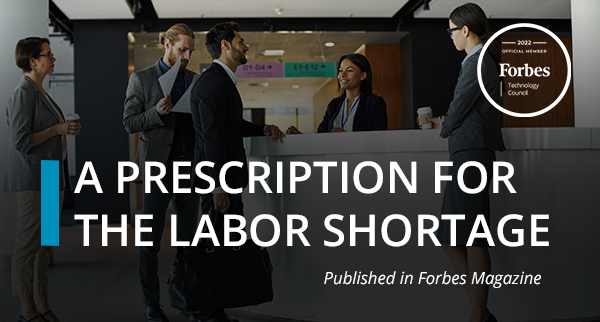Published in Forbes - The hospitality industry has always suffered from high turnover, but the ongoing labor crisis has made the current situation more untenable as operations either grind to a halt or are so poorly staffed that service quality dips below acceptable levels. Guests who gave operations more leeway during the pandemic are beginning to demand more value for the rates they're paying.
To lessen and prevent this bleeding effect on hospitality's workforce, businesses need to take a closer look at what exactly in today's environment, both external and internal, is shrinking the labor resource pool while also determining what can be done to access additional labor pools or even secondary job employees. Only then can effective response measures be identified and implemented to adequately staffed operations that ensure long-term business success.
Where Businesses Are Missing The Mark
With wage hikes often serving as the only business strategy, what becomes clear is that a disconnect exists between what employers believe is important to their workers versus what employees themselves consider to be a priority. This sole tactic of just increasing pay largely appears to be a purely reactive and short-lived response. Fair wages are a key contributor but aren't the primary factor in creating long-term loyalty.
Regardless of wage increases, hospitality front-line jobs are still considered to be low-paying occupations. Even with raising hourly pay, workers often continue to live paycheck to paycheck. Placing themselves in their employees' shoes, business operators should ask whether an increase in hourly pay for low-wage employees is sufficient to create a competitive edge when all operators can easily do the same thing.
Rather than trying to tackle workforce shortages by guessing which workplace adjustments will resonate with their employees, businesses need to go a step further by directly asking workers themselves. Employers need to clearly identify what mix of "benefits and expectations" employees have that will impact loyalty.
Further to the efforts of attracting and retaining staff, service organizations need to recognize that a B-to-C relationship with their staff will also promote higher levels of loyalty, performance and profitability. Forty years ago, I heard the following: "Guest relations mirror employee relations." We also speak of external (guests) and internal (employees) customers. Companies need to embrace this perspective.
Finally, with the rise of the gig economy continuing to influence employee expectations over what counts as a fair work-life balance, businesses should not be surprised to hear that among the top demands required to earn worker loyalty is increased schedule flexibility. According to a FlexJobs survey, 80% of employees indicated they would have a greater sense of loyalty if flexible scheduling was an option.
Simple Solutions To A Complex Issue
With this as our background, the question becomes how to get started. First and foremost, create feedback mechanisms that ensure you are not only listening but hearing what your team is saying. Surveying your employees' engagement can significantly uncover patterns and trends pointing to a need to revise specific operational areas. Surveys can provide not just a snapshot of employee sentiment at a fixed point of the year but, thanks to their enhanced flexibility and ease of use, can serve as a continuous source of worker viewpoints throughout the year. In some cases, where new managers have taken over an operation, 60 days is a good period to have a quick survey completed.
In addition to uncovering employee issues, look into the paradigm of when certain tasks are completed. In today's environment, some tasks that presently are done during the day could also be done in the evening, thereby opening up a potential new staff pool.
From a scheduling perspective, there will still be team members who want their schedules predetermined, while others will want greater flexibility. Industry leaders must provide employees with a choice over which shifts they would like to work. While labor management solutions can help with this, leaders should mainly look for solutions that can automate the scheduling process and can ensure that projected service volumes are adequately staffed throughout the day. Additionally, open shifts can be presented to staff for additional work hours. Employees who carry two jobs generally find it more beneficial to have self-selection.
Vital in today's market is also a need to provide employees with a sense of encouragement in order to feel valued by their employer. Gamification capabilities can provide a means to this end by offering the opportunity to reward employees for their efforts. This can include acknowledging employees for working longer hours, performing tasks more efficiently, learning a new skill and much more. Rewards can come in the form of points for a free night's stay or a free meal at an on-site restaurant, representing a minimal cost for business operators while boosting employee productivity and their sense of worth. Using gamification to reward staff actions and activities can better align organizations with the loyalty point systems that we all experience in our day-to-day lives.
A Better Way Forward
By examining and understanding the causes of what is pushing employees away and what would cause them to stay, hospitality leaders can finally begin to put a stop to the labor drain that has plagued the market for too long. With a range of strategies now available, it is up to each business to make full use of them to preserve the loyalty of their employees, build up a reputation as an employer of choice and look to tap into new availability for staffing.






